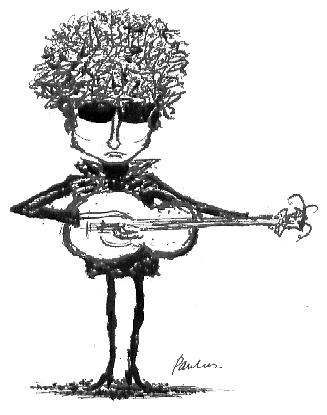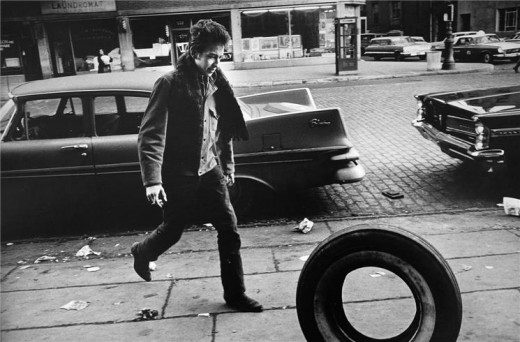The term “fan”, when used to describe somebody, is an abridgement of the word “fanatic”. To be a fanatic doesn’t mean that you’re going to strap a bomb to your chest and blow up a pizzeria for Miley Cyrus, say, but it does mean that you’ve made up your mind. To use gentler terms, it means to be a follower, a devotee, an admirer.

I’ve been a Bob Dylan fanatic since I was 16 years old. And I choose “fanatic” because I choose to emphasize the impact that this artist has had on my life. That’s what music should do. That’s what great art does. It inspires, it motivates, it tells us that we can create the same and we too shall understand.
I found Bob when I was in high school. I was looking for something that not a lot of people knew about and the culture of the 1960’s proved to be a perfect spot to look. It made it a lot easier to stand out, given the artistic and eclectic environment that I found myself in my freshman and sophomore years. For his birthday, my dad was given Bob Dylan’s Greatest Hits. As I was wont to do at the time I regularly raided my father’s extensive music collection to find something new to me. This is how I discovered Johnny Cash, Dire Straits and Credence Clearwater Revival, among others. But this guy, this Dylan was different.
On this lone record, there were songs like “Blowin’ in the Wind”, “Just Like A Woman”, “Like A Rolling Stone” and “Subterranean Homesick Blues”. In half the record, it was demonstrated what a versatile artist he was. He could play rock and roll (and I mean real rock and roll), psychedelic blues, thoughtful acoustic and politically-minded folk and he could play those songs effortlessly, like he was just walking down the street. It was insane. It blew my mind.
The addiction began and I had to feed the habit. Shortly thereafter, I bought Live 1966: The “Royal Albert Hall” Concert. I immediately went home, I put the CD in the player and sat and listened.
That’s something that isn’t done with today’s music. Back in the day, when you bought a record, you would play it, either by yourself or with friends, and you would listen to it. You wouldn’t do anything else. You weren’t playing video games, you weren’t reading or writing some schlock; you listened to the music and took it in for what it was. You let the artist say what it was that they had to say. You gave them your attention. After all, you spent the dollar to give them the chance to begin with.

On Live 1966, he sings “Desolation Row” in its entirety. It’s one of my personal favorites and may actually be the best song that he ever wrote. As I sat and listened to the performance, he easily slides into the lyric “Einstein disguised as Robin Hood…” The best way to describe the sensation in my head was that my mind was blown. I had never heard something like that before and I’ve spent time since then trying to think of the image. I try to think of the circumstances why Einstein would have to do that. Where did he get the costume? Wouldn’t he know that anyone would recognize him? I enjoy the mental chase that gives way and I lose every time.
Then, I made the most important purchase of my life: Blood on the Tracks. I have no problem saying that it’s his best album, period, but I’m open to criticism. Blonde on Blonde is the one that is generally considered to be better, but I disagree for the following reason: B o B is an excellent recording and the imagination behind it is a force of nature and cannot be denied. However, art should have the capacity to connect and I feel that Blood on the Tracks makes that connection better, quicker and stronger.
He manages, in the brief album that it is, to encapsulate so many different aspects of a relationship. He took to songwriting in this album like some people paint pictures or take photographs. There’s usually more than one story in a picture, there’s more than one perspective to be shared and understood. All the songs are capable of doing that. In “Tangled Up In Blue”, he shifts perspectives quickly talking about himself and then this lonely man. He makes the change as fast as he moves to the next line in the song. It’s a song that offers a fresh and unique perspective on life almost every single time I listen to it when I reach a new stage in my life.
-inlay.jpg)
The first time I heard the song “Idiot Wind”, I cried. Hard. It hurt. The reason why was because I honestly had no idea (at the age of seventeen) how someone was able to articulate what it was that I was going through at that point in my life. I was struggling to understand relationships, I was quickly realizing that I had made mistakes that I was going to have to live with (at least for a while, I was only 17) and here was a recording of a man singing by himself in a booth thirty years prior speaking to the exact moments that I was going through. It was insane. It might be the first time I had a genuine spiritual experience in my life. It’s the remarkable thing about a truly great artist. They seem to speak like shamans in the village. While you know that they are just stumbling along like the rest of us, they manage to put your thoughts and feelings in such a way that you wonder how you’ve been able to think or feel without them. I actively sought people out and told them to listen to the song. There was one instance where I actually made the man sit down and listen to the entire song. It was the only way I could talk sometimes. I relied on it too much. I let it speak for me and let the ambiguity of the work entrench itself in the mind of the opposing listener.
That’s a dreadful thing about music: sometimes we let it take over. We let it define us instead of us defining it. The artist may speak to our feelings, our lives or our moment, but we can’t let it speak for us constantly. The man had no idea what it was I was trying to say because he spent the time trying to figure out what Dylan was trying to say. He walked away shaking his head and I remember being insanely confused. Why didn’t it work? Why didn’t he understand how I felt about the failed relationship that I just went through?
For some people, it’s the Beatles. For some, it’s Dave Matthews Band. For others, it’s Nickelback. I think that it’s important for us, just as people, to have that someone or something that we latch on to that helps us understand ourselves and that which surrounds us.
I know that I’m not alone in thinking about this in regards to music. Hell, I know that I’m not the only person who feels this way about Bob Dylan (though I don’t think that you’re going to see fans try to imitate his hairstyle, like you do with Elvis fans). The thing about music that we love is that it connects us completely. If we let it.
To say that we are a fan is to be passive about the work that we admire; to admit that we are fanatics is to admit that we are involved in the artistry that we search after. And if you’re not involved, you’re not paying attention.

How does it feel?

No comments:
Post a Comment